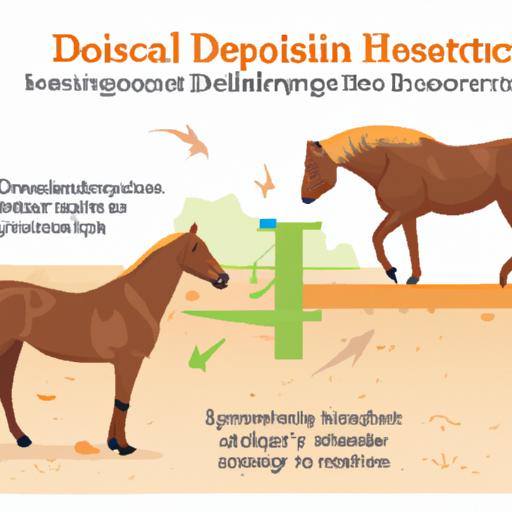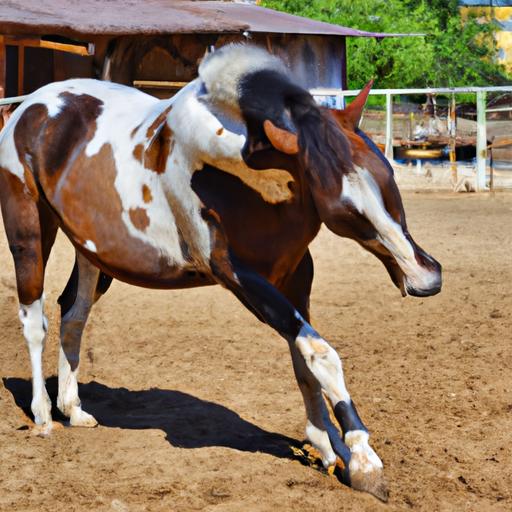Discover the significance of Depo in managing horse behavior. Learn how this hormone can address common issues, creating a harmonious partnership.
Horses are magnificent creatures known for their strength, grace, and unique behavior patterns. However, just like humans, they can experience behavioral issues that affect their overall well-being and performance. One solution that has gained significant attention in the equine world is Depo, a popular medication used to manage horse behavior. In this article, we will delve into the significance of Depo in horse behavior management and explore the common issues it addresses.
A. Understanding the significance of Depo in horse behavior
Depo, short for medroxyprogesterone acetate, is a synthetic hormone commonly used in equine management. It plays a crucial role in regulating horse behavior by influencing the hormonal balance within their bodies. By administering Depo, horse owners and trainers have the ability to address various behavioral issues and promote a more harmonious environment for their horses.
B. Brief overview of common horse behavior issues
Horses, like any other living being, can exhibit a range of behavioral challenges that may hinder their training, performance, and overall quality of life. Some common issues include aggression and dominance behaviors, anxiety and nervousness, hyperactivity, and stall vices. These issues not only pose risks to the horse’s safety but can also impact the relationship between the horse and its handler. Recognizing and addressing these behavior problems is essential for creating a conducive and productive environment for both horse and rider.
As we explore the effectiveness of Depo in managing horse behavior, we will delve deeper into its mechanism of action and how it can help alleviate the aforementioned issues. Stay tuned for the next section, where we will uncover what Depo is and how it affects horse behavior.
Remember, understanding the significance of Depo in horse behavior management is the first step towards creating a harmonious and fulfilling partnership with your equine companion.
What is Depo and How Does it Affect Horse Behavior?

A. Explanation of Depo and its purpose in equine management
Depo, or medroxyprogesterone acetate, is a synthetic hormone primarily used in equine management to modify horse behavior. It is commonly administered through intramuscular injections and works by regulating the hormonal balance within the horse’s body. Depo acts as a progestin, mimicking the effects of progesterone, a naturally occurring hormone in horses.
The purpose of Depo in equine management is to suppress or modify certain behaviors that may hinder a horse’s training and performance. By influencing the hormonal levels, Depo can help reduce aggression, anxiety, hyperactivity, and other behavioral issues commonly observed in horses.
B. Effects of Depo on horse behavior
Depo has been found to have a calming effect, promoting a more relaxed and manageable demeanor in horses. It can help reduce aggressive behavior, territoriality, and dominance tendencies, allowing for smoother interactions between horses and their handlers. Additionally, Depo can help alleviate anxiety, nervousness, and excessive energy levels, enabling horses to focus better during training sessions and competitions.
It is important to note that the effects of Depo may vary from horse to horse. While some horses may show significant improvements in their behavior, others may experience minimal changes or no response at all. Therefore, it is essential to work closely with a veterinarian to determine the appropriate dosage and evaluate the individual horse’s response to Depo.
C. Research studies on the impact of Depo on horse behavior
Numerous research studies have explored the impact of Depo on horse behavior, providing valuable insights into its effectiveness. These studies have demonstrated positive outcomes, showing a reduction in aggressive behaviors, anxiety, and hyperactivity in horses receiving Depo treatment. However, more research is still needed to fully understand the long-term effects and potential side effects of Depo on horse behavior.
In the next section, we will delve into the common horse behavior issues that can be effectively addressed by Depo. Stay tuned to discover how Depo can help improve your horse’s behavior and enhance your partnership.
Common Horse Behavior Issues Addressed by Depo

Depo has emerged as a valuable tool in the management of various horse behavior issues. Let’s explore some of the most common behavioral challenges that Depo can effectively address:
A. Aggression and Dominance Behaviors
Aggression and dominance behaviors can pose significant risks to both horses and their handlers. These behaviors may manifest as biting, kicking, or displaying territorial aggression towards other horses or humans. Depo has shown promising results in reducing aggressive tendencies, promoting a calmer and more cooperative demeanor in horses.
B. Anxious and Nervous Behaviors
Just like humans, horses can experience anxiety and nervousness in various situations, such as during transportation, competitions, or even in unfamiliar environments. Depo has been known to help horses cope with anxiety by stabilizing their hormone levels, resulting in a more relaxed and focused state of mind.
C. Hyperactivity and Excessive Energy Levels
Hyperactivity and excessive energy levels can make it challenging for horses to concentrate during training sessions or maintain a steady performance. By administering Depo, horse owners and trainers can help regulate these energy levels, allowing horses to better channel their energy and focus on their tasks.
D. Stall Vices and Repetitive Behaviors
Stall vices, such as cribbing, weaving, and stall walking, are repetitive behaviors that can be detrimental to a horse’s physical and mental well-being. Depo can aid in reducing the frequency and intensity of these vices, promoting a healthier and more contented horse.
Depo has proven to be a valuable tool in addressing these common horse behavior issues, helping horses lead more balanced and fulfilling lives. In the next section, we will delve into the administration of Depo and discuss the proper dosage and potential side effects. Stay with us to learn more about how to effectively implement Depo in your horse’s behavior management.
Administering Depo to Horses

As we delve deeper into the world of Depo and its impact on horse behavior, it is crucial to understand the proper administration and considerations when using this medication. Here, we will explore the necessary steps and precautions involved in administering Depo to horses.
A. Proper dosage and administration guidelines
Administering the correct dosage of Depo is vital to ensure its effectiveness and avoid any potential complications. It is crucial to consult with a veterinarian who can provide accurate guidance based on the specific needs and condition of your horse. They will consider factors such as the horse’s weight, age, and behavior issues to determine the appropriate dosage.
Depo is typically administered via intramuscular injection, with the most common site being the neck. It is important to follow proper injection techniques to minimize discomfort for the horse and maximize the medication’s absorption. Your veterinarian can guide you on the correct injection site and technique to ensure safety and efficiency.
B. Potential side effects and precautions
While Depo can be a valuable tool in managing horse behavior, it is essential to be aware of potential side effects and take necessary precautions. Some horses may experience mild side effects such as swelling or soreness at the injection site. However, these side effects are usually temporary and resolve on their own.
It is crucial to monitor your horse closely after administering Depo to identify any adverse reactions. If you notice any concerning symptoms such as severe swelling, lameness, or behavioral changes, it is important to contact your veterinarian immediately.
C. Consultation with a veterinarian before administering Depo
Before making any decisions regarding the administration of Depo to your horse, it is imperative to consult with a veterinarian. They possess the expertise and knowledge to assess the specific needs of your horse and determine if Depo is the appropriate solution for their behavior issues. A veterinarian can provide valuable insights, address any concerns, and guide you through the entire process, ensuring the well-being of your horse.
Remember, proper administration, understanding potential side effects, and seeking professional advice are essential components of safely using Depo to address horse behavior issues. In the next section, we will explore alternative approaches to managing horse behavior, providing a comprehensive view of the various options available.
Alternative Approaches to Managing Horse Behavior
When it comes to managing horse behavior, Depo is just one tool in the arsenal. While it can be highly effective, it’s important to explore alternative approaches that can complement or even replace the use of medication. By incorporating these approaches into your horse’s routine, you can create a holistic and comprehensive plan for addressing behavioral issues. Let’s take a closer look at some alternative approaches to managing horse behavior.
A. Natural horsemanship techniques and training methods
Natural horsemanship techniques have gained popularity in recent years for their emphasis on building a strong bond and mutual trust between horse and handler. These techniques focus on understanding and working with the horse’s instincts and natural behaviors, allowing for a more harmonious and cooperative partnership. By employing methods such as groundwork, liberty training, and positive reinforcement, you can address behavioral issues by addressing the root causes and developing a deeper connection with your horse.
B. Nutritional adjustments and supplements
Nutrition plays a vital role in a horse’s overall well-being, including their behavior. Sometimes, behavioral issues can be linked to deficiencies or imbalances in their diet. Consulting with an equine nutritionist or veterinarian can help you identify any nutritional gaps and make appropriate adjustments. Additionally, certain supplements, such as calming herbs or magnesium, can aid in promoting a more relaxed and focused state of mind for your horse. However, it’s important to work with professionals to ensure the correct dosage and compatibility with your horse’s specific needs.
C. Environmental modifications and turnout arrangements
The environment in which a horse lives can greatly impact their behavior. Making modifications to their living space can help alleviate stress and promote a more balanced state of mind. Providing ample turnout time in a safe and stimulating environment allows horses to fulfill their natural instincts, engage in social interactions, and release excess energy. Additionally, ensuring a well-designed and organized barn setup can minimize stress and promote a sense of security for your horse.
By exploring these alternative approaches, you can create a well-rounded plan for managing your horse’s behavior. Remember, every horse is unique, so a combination of these methods may be necessary to address individual needs. In the next section, we will dive deeper into the administration of Depo and the precautions associated with its use.


